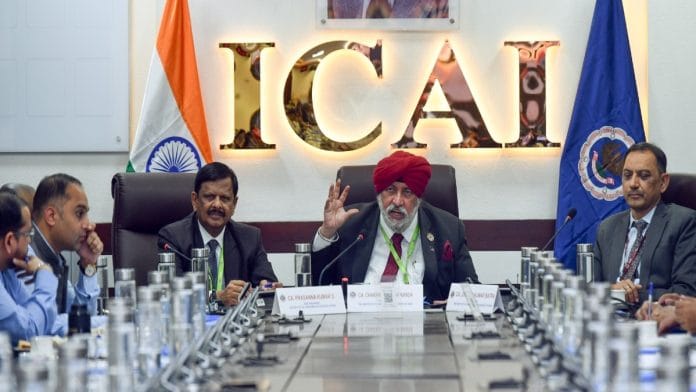New Delhi: Regulations against raising private equity and restrictions in forming multi-disciplinary partnerships (MDP) are among the key impediments preventing domestic consulting and auditing firms from expanding and competing with the Big 4, Charanjot Singh Nanda, president of the Institute of Chartered Accountants of India (ICAI) told ThePrint.
The Modi government is currently working on regulatory reforms to promote domestic consulting firms amid US tariff challenges and growing asymmetry in India’s professional services landscape which is dominated by the Big 4—Ernst & Young (EY), Deloitte, PriceWaterhouseCoopers (PwC) and KPMG.
Last month, a high-level meeting chaired by Principal Secretary to the Prime Minister Shaktikanta Das along with officials from ministries of corporate affairs and finance reviewed plans to create domestic MDP firms.
“Currently chartered accountant firms in India are not allowed to raise capital via private equity and public issue,” the ICAI president told ThePrint.
ICAI is a statutory body responsible for regulation and development of chartered accountants in the country. The affairs of the ICAI are managed by a 40-member council in accordance with provisions of the Chartered Accountants Act, 1949, and the Chartered Accountants Regulations, 1988. The institute functions under the administrative control of the Ministry of Corporate Affairs.
Access to capital is essential for domestic firms to expand their operations and invest in talent and technology. According to Nanda, discussions are on for a policy that will allow domestic firms to raise capital.
Another challenge that domestic audit firms face is ICAI’s 2021 MDP framework that allows only six kinds of professionals to form partnerships—cost accountants, company secretaries, advocates, actuaries, architects and engineers. It excludes key professionals like MBAs, IT and insolvency experts, thereby limiting the scope of MDP firms.
“While a CA firm is allowed to share its fee with MBAs and IT professionals, they cannot make them partners under ICAI rules,” said Nanda.
Discussions are ongoing with regulatory bodies of actuarial science, company secretaries and others to expand the scope of domestic consulting firms by allowing them to partner with other professionals.
“All regulatory bodies must come together with a policy that promotes and encourages creation of large domestic consulting firms,” said Nanda.
According to Nanda, the new policy must focus on scale and innovation (allowing consolidation of firms), enhancing service offerings (environment, social governance, forensics, risk advisory), undertaking digital transformation (accessibility to technology like AI, Cloud), promoting and nurturing talent, while also easing capital raising requirements.
“The objective is to create Indian consulting firms that can match international companies in size and sophistication,” said Nanda.
Rakesh Nangia, chairman of Nangia & Co. LLP, an India-based consulting firm, domestic firms lack in scale to compete on pricing or invest in long-term capabilities in comparison to large international firms.
For domestic consulting firms to grow, he said, there is a need for government contracts to have more flexibility in the tendering process by relaxing turnover criteria so that smaller Indian firms can bid for contracts.
To have a level playing field, Nangia recommends policy support to promote domestic firms. “The government could encourage public-sector companies to engage with homegrown firms and educate chambers of commerce to utilise services of domestic firms.”
He added, “There is also a need to provide grants or low-interest loans for infrastructure upgrades, and offer fiscal incentives, rebates or export benefits.”
According to the Ministry of Corporate Affairs, the global consulting and auditing industry is valued at nearly $240 billion, and much of India’s high-value consulting and auditing work is being done by multinational names.
But once the new MDP policy comes into action, is there a possibility the Big 4’s business will be impacted? Nanda refuted such theories, saying, “there will be enough work for everyone in the Indian market”.
We reached out to the Big 4 firms via e-mail for their views, but did not receive any response. This report will be updated once the response is received.
Dominance of Big 4 in India
The Big 4 have a formidable presence in India and operate across multiple verticals by offering services in management consulting, risk advisory, taxation, mergers and acquisitions, technology transformation, among others.
As per media reports, the combined revenue of the Big 4 in India was Rs 38,000 crore in FY2024 and is expected to surpass Rs 45,000 crore in FY 2025.
Among major clients of the Big 4 are the central and state governments. For context, between 2017 and 2022, Big 4 consulting firms bagged at least 305 consulting assignments worth nearly Rs 500 crore from various Indian government ministries and departments according to consulting news website Consultancy.in.
These international firms enjoy the brand value, technical expertise, access to capital and international affiliation to on-board clients in India.
“Global firms bring brand recognition, deep capital, and cross-border expertise,” said Nangia, adding, “they attract top talent with higher pay and international exposure. Large clients perceive them as more reliable and prestigious, while domestic firms struggle to build trust in high-stakes or global deals.”
However, under ICAI rules, foreign firms are not allowed to directly operate in India or sign audit reports. Hence, Big 4 firms operate in India via member firms or local affiliates that are registered with ICAI.
For context, SR Batliboi & Company is an Indian affiliate firm for EY, while BSR & Co LLP is for KPMG that signs audit reports. These firms have chartered accountants registered with ICAI.
(Edited by Viny Mishra)
Also read: Before McKinsey, Bain, India had its own management gurus. Now daughters are taking the lead






